Originally published on May 4, 2023
Note: This week’s set of Energy Talking Points is long, and took both me and Steffen Henne (my Head of Research) a long time time to prepare. We thought it was worth the effort to create (and is worth your effort to read) because the subject matter, the UN IPCC's recent Synthesis Report, has a huge influence on global energy policy. And it is just an absolute piece of garbage. Yet it’s gotten very little pushback. We hope that demolishing the “Report” in detail will help discredit the current state of the IPCC, which at this moment is one of the most destructive forces in the world.
The IPCC's heralded Synthesis Report is supposed to accurately synthesize the best information about human beings' climate impacts in order to rationally guide policy.
Instead, it severely distorts science to advance a corrupt political agenda.
-
The UN's Intergovernmental Panel on Climate Change (IPCC) recently published, to great fanfare, its “Synthesis Report” (SR)—the culmination of its lengthy 6th “Assessment Cycle” of reports on various aspects of human beings’ climate impacts and their implications for policy.1
-
The Synthesis Report is supposed to accurately synthesize the best info about human climate impacts—including the threats of dangerous temps, storms, floods, etc—to rationally guide policy, above all what to do about fossil fuels, the leading cause of climate-warming GHGs.
-
Because of the Synthesis Report's prestige, the world took it very seriously when they heard about its dire claims. E.g., UN Chief Antonio Guterres saying we can't have a “liveable future” if we don’t take “urgent climate action”—above all rapidly eliminating fossil fuel use.2
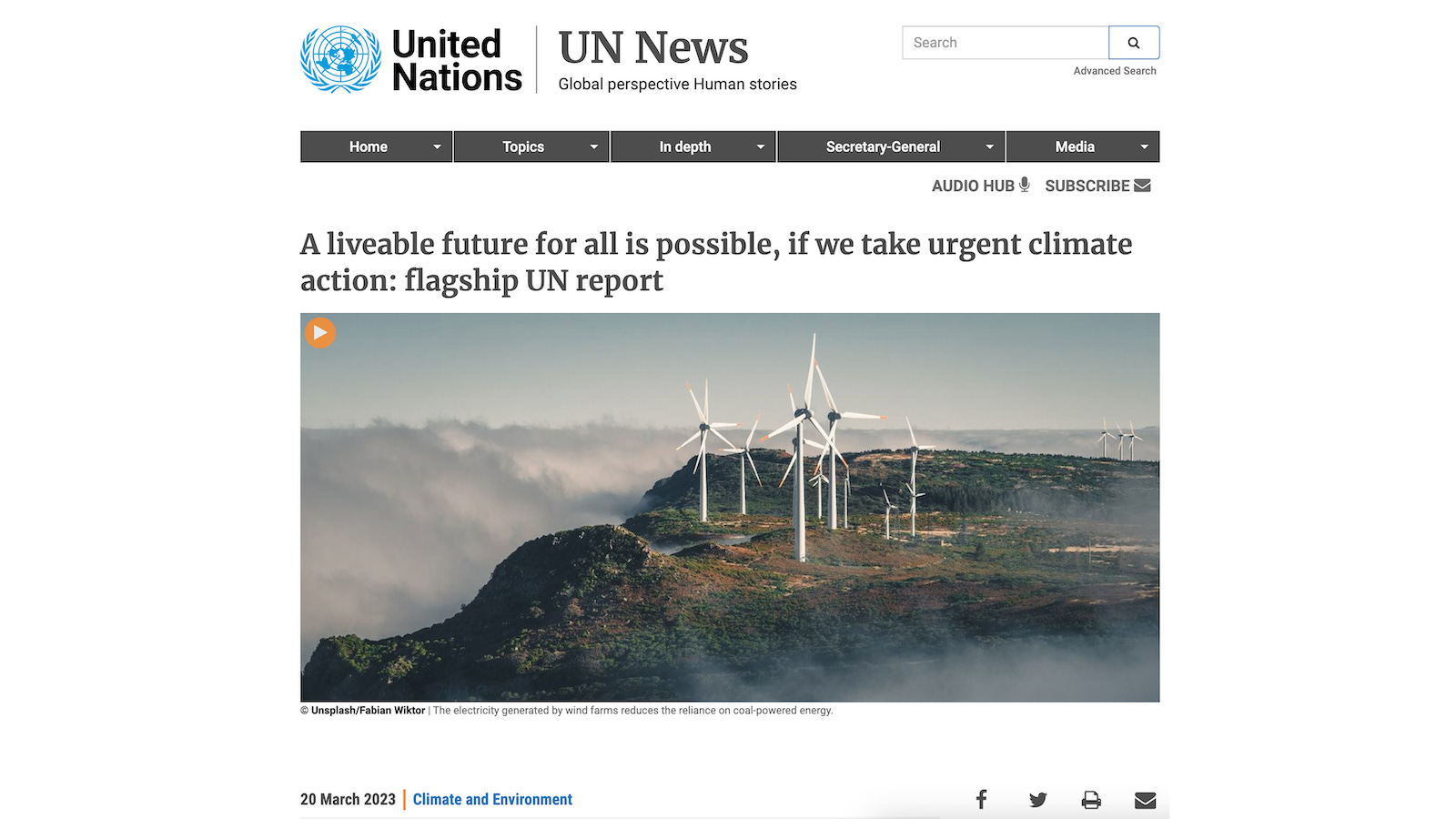
-
Even skeptics of the IPCC Report's drastic calls for rapidly eliminating fossil fuels—often via means that give enormous power and money to favored politicians—may feel uncomfortable questioning a “scientific” Report.
But a common-sense reading reveals that it's total garbage.
-
A proper climate synthesis report must cover 2 key issues:
- An evenhanded (covering minuses and pluses) and precise account of our climate impacts.
- An account of our ability to master climate danger, including the use of fossil fuel to neutralize its own negative climate impacts.
-
1 An evenhanded and precise account of our climate impacts.
With rising greenhouse gasses we must consider both negatives (e.g., more heatwaves) and positives (e.g., fewer cold deaths, global greening from CO2). And we must be precise, not equating some climate impact with huge impact.
-
2 An account of our ability to master climate danger
Any valid climate synthesis must account for climate mastery, because the same fossil fuels that impact climate can also neutralize negatives—e.g., via fossil-fueled air conditioning to alleviate heat and irrigation to alleviate drought.
-
You don't need to be a scientist to know that a proper climate synthesis report should include both an evenhanded and precise account of our climate impacts and an account of our ability to master climate danger.
And if you read the IPCC Synthesis it's obvious it fails at both.
-
I recommend just skimming the IPCC Synthesis Report, linked below—this report that is supposed to be so brilliant—and just ask yourself if it is remotely evenhanded about human impact on climate, or if it accounts for our mastery of climate.
UN IPCC AR& Synthesis Report -
Instead of an evenhanded and precise account of our climate impacts, the IPCC SR gives us a blatantly biased view of exaggerated negative impacts, with no mention of positives like global greening thanks to CO2 fertilization of the atmosphere or decreasing cold-related deaths.
-
Instead of accounting for our climate mastery ability, the IPCC SR ignores our ability to neutralize negative climate impacts, despite the fact that we've driven climate disaster deaths down by 98% over the last century!
This is like a polio report omitting the polio vaccine.3
-
By exaggerating our negative climate impacts and ignoring our ability to master climate danger, the IPCC Synthesis perpetrates a 3-part perversion of science:
“A: Current Status and Trends”
“B: Long-Term Climate and Development Futures”
“C: Near-Term Responses in a Changing Climate” -
“A: Current Status and Trends” distorts the present state of climate danger
“B: Future Climate Change, Risks, and Long-Term Responses” distorts the evidence about future climate danger
“C: Responses in the Near Term” calls for huge power and money for an anti-fossil-fuel agenda
-
The IPCC's “Synthesis Report” has been criticized intelligently by various experts, including Roger Pielke and Patrick Brown.
But this isn't enough. All experts in the field should unequivocally condemn this dangerous piece of garbage and the process that produced it.4
-
How the IPCC severely distorts the present state of climate danger
By exaggerating negative impacts and ignoring climate mastery, the IPCC portrays the world as suffering “widespread adverse impacts… and related losses and damages” when climate danger is lower than ever!
-
Any honest “Current Status and Trends” report on climate would start by acknowledging that any negative climate changes so far have been far outweighed by our increasing climate mastery ability, which led to plummeting climate deaths thanks to our fossil fuel-powered technology.5
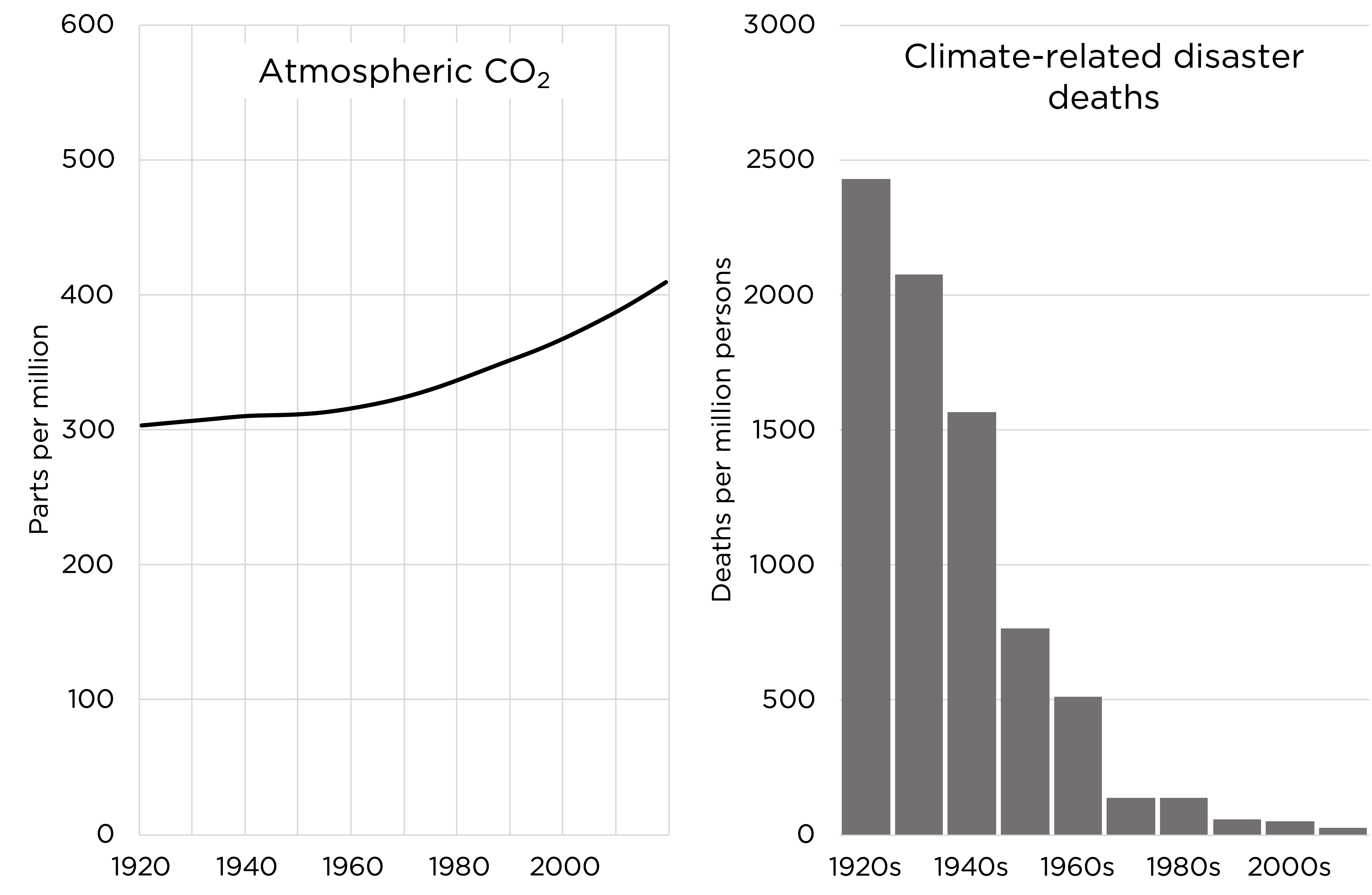
-
Insofar as a climate report addresses the overall state of the world, it should acknowledge that human life has never been better. E.g., extreme poverty (~$2/day) plummeted from 42% in 1980 to <10% today. And it should recognize fossil-fueled industrialization as a root cause.6
-
The IPCC's “Current Status and Trends” 100% falsely portrays fossil fuels as making climate, and life, worse than ever, even though they’ve made both better: “Climate change has adversely affected human physical health globally… and is contributing to humanitarian crises.”
-
Any honest “Current Status and Trends” on climate would also acknowledge the impressively stable level of economic losses from climate—vs. an expected catastrophic increase–despite the increasing accumulation of wealth in disaster-prone spots like coastal areas.7
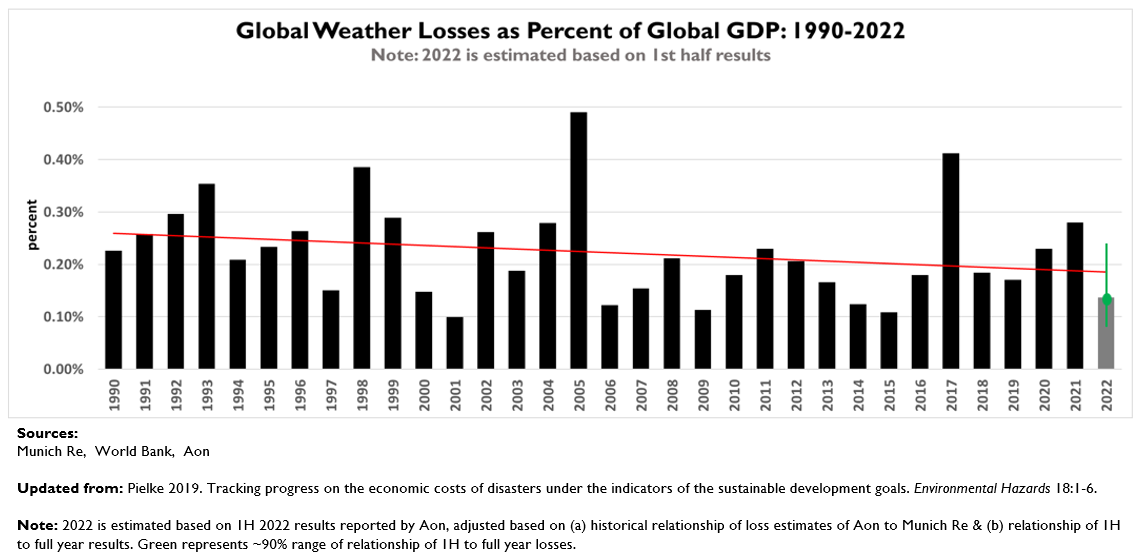
-
Instead of acknowledging flat or declining climate damages, the IPCC portrays things as worse than ever: “individual livelihoods have been affected through, for example, destruction of homes and infrastructure, and loss of property and income, human health and food security.”
-
Any honest “Current Status and Trends” report should acknowledge that while everyone has become safer from climate, the most developed countries are safest. And thus the path to increasing safety is more development, which will largely require more fossil fuels for the foreseeable future.8
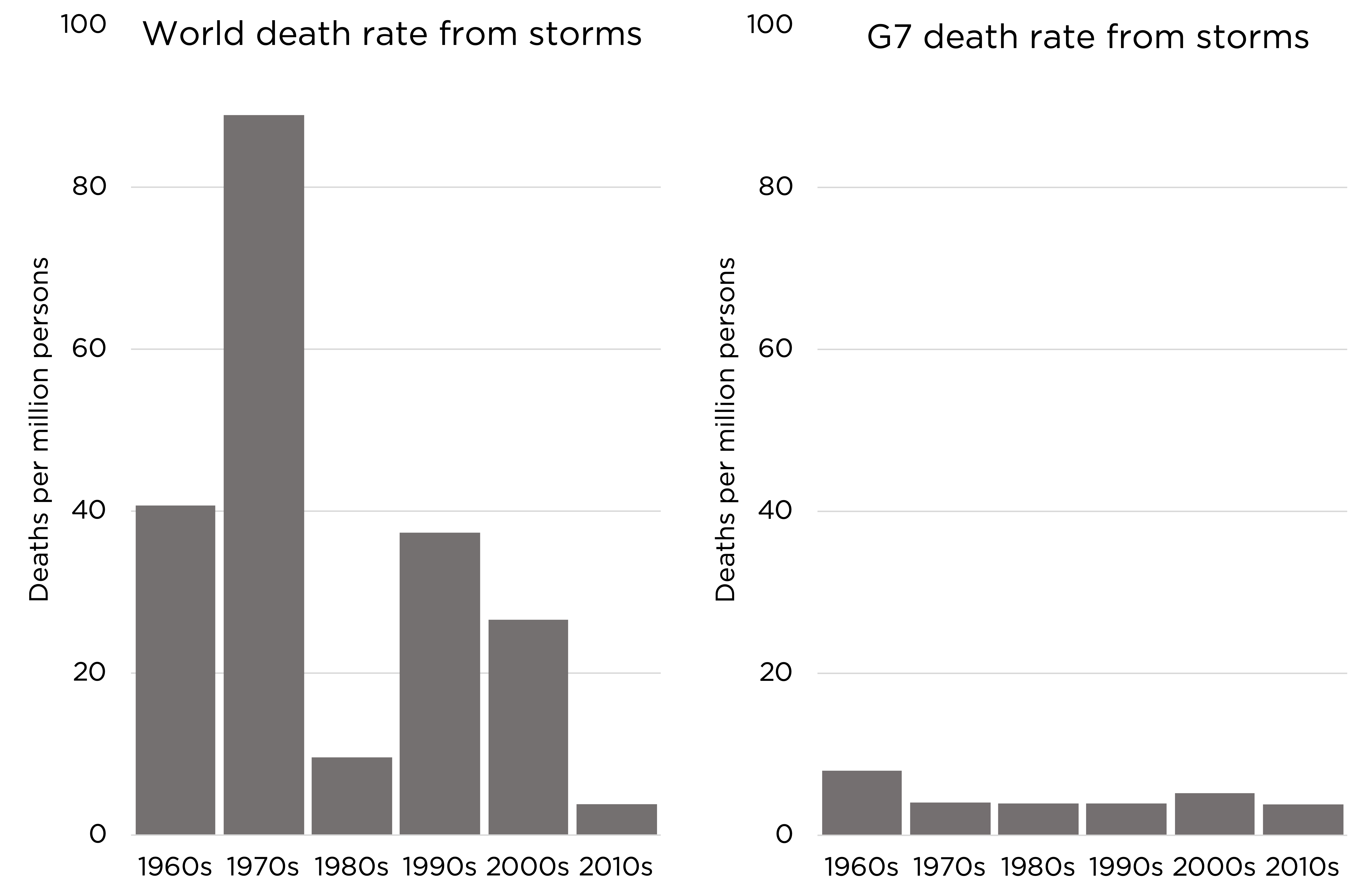
-
Instead of acknowledging the improving climate safety of the poor world, largely due to fossil fuels. the IPCC pretends their situation is worsening due to the world's use of fossil fuels.
This paves the way for advocating massive, unjust “climate reparations” schemes.
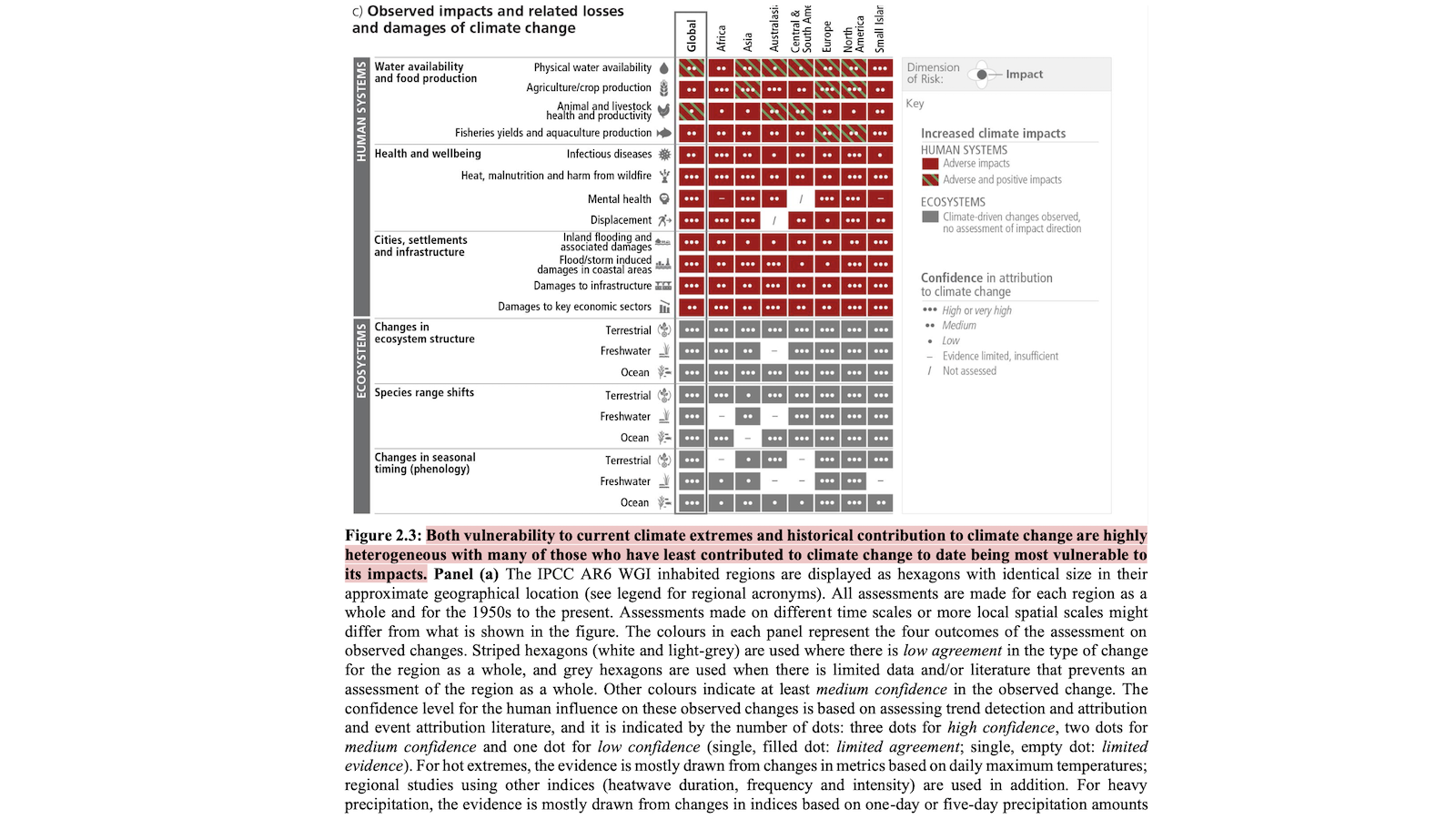
-
To summarize: “The Current Status” section of the IPCC “Synthesis Report” gives a 180-degree false portrayal of today's record-low climate danger by exaggerating our negative impacts and ignoring our climate mastery, so as to portray climate danger as record-high.
-
How the IPCC severely distorts the future state of climate danger
Just as the IPCC distorts the present evidence about (actually declining) climate danger, so it does with future danger to falsely claim: “Climate change is a threat to human well-being and planetary health.”
-
The fact that the IPCC's Synthesis Report portrays record-low current climate danger as record-high calls its “Future Climate Danger” section into question: Why trust predictions about the future by those who deny the reality of the present?
And indeed, the section is garbage.
-
To understand how bad the IPCC's “Future Climate Change, Risks, and Long-Term Responses” section is, note that it portrays climate danger as “a threat to human well-being” even though the reports it's based on say nothing of the sort.
-
Preceding parts of the IPCC's Sixth “Assessment Report” that supposedly inform the Synthesis Report have many flaws—most notably, they severely underestimate humanity's climate mastery ability.
But those reports do not show a threat to a “liveable future” like the “Synthesis” claims.
-
The IPCC's Assessment Reports, contrary to the “Synthesis” of "a threat to human well-being" all show that the overall well-being of humans will continue to increase for the foreseeable future.
The “Synthesis” is a lie.9
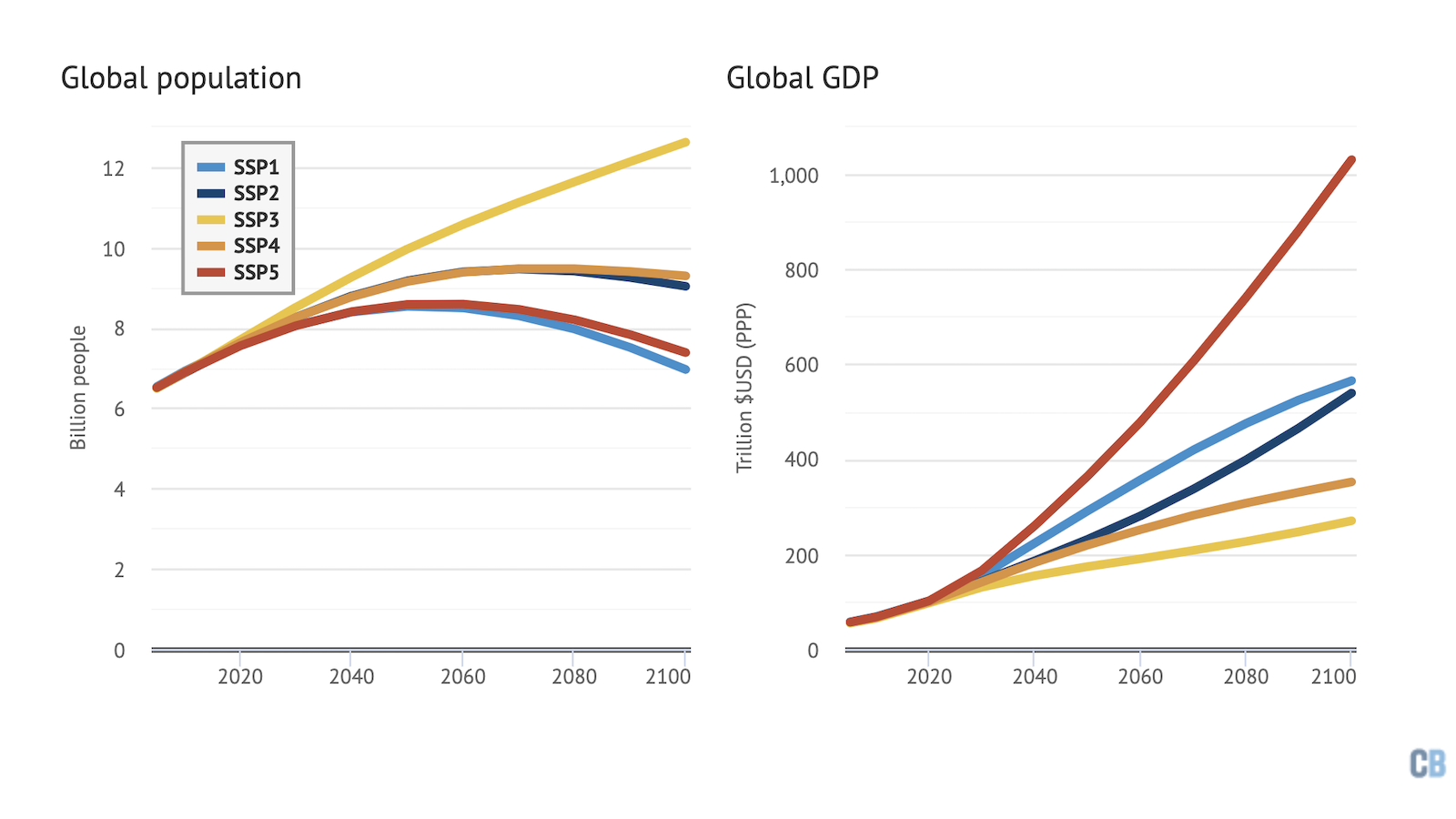
-
Looking at the claims of IPCC Assessment Reports about future climate impacts, there is nothing that human beings can't master. E.g., it doesn't project storms that would overwhelm us by being 2-3 times more intense but rather projects storms being 1-10% more intense.10
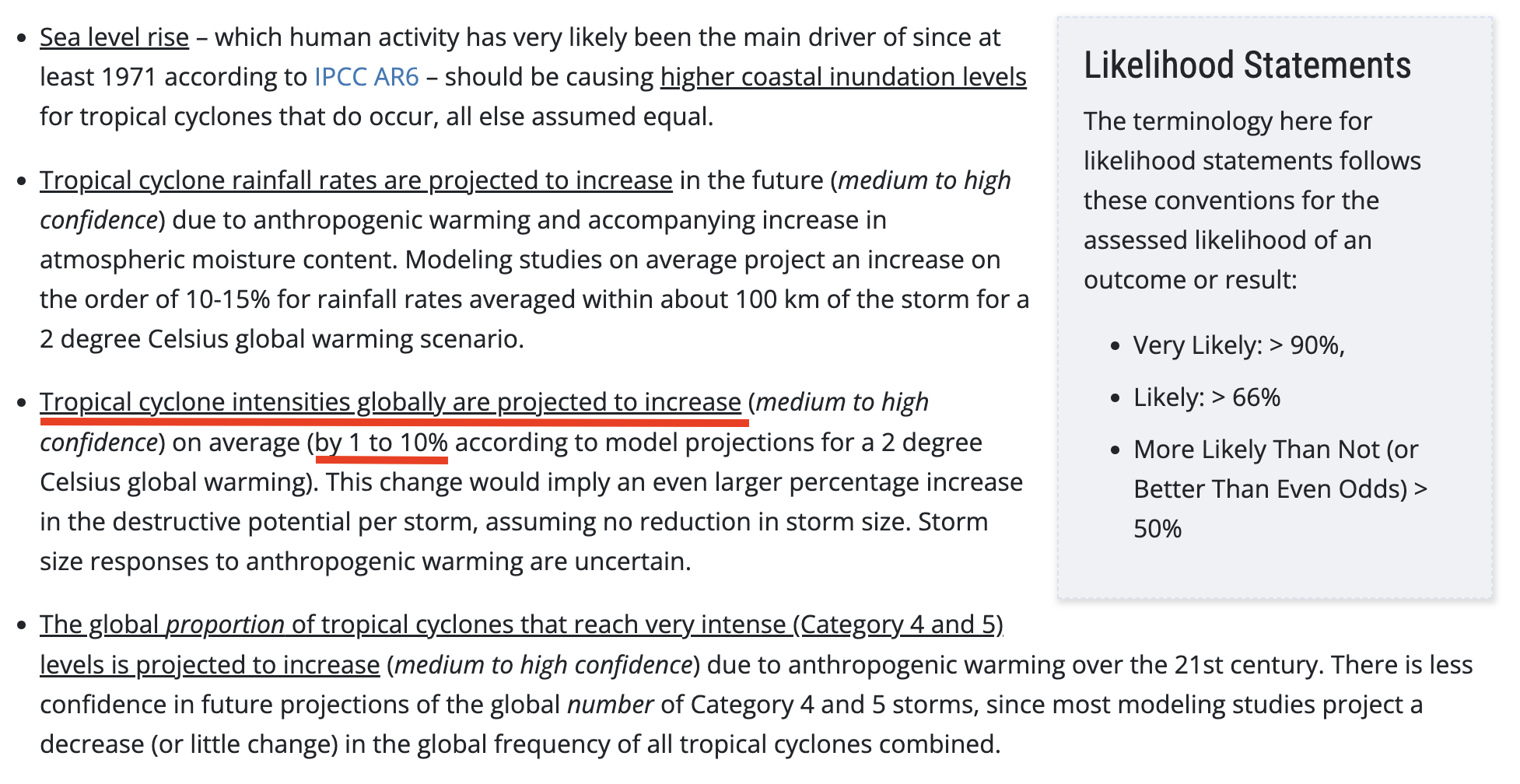
-
The most plausible danger of rising CO2 levels and temps is rapid sea level rises that would destroy coastal investments. But extreme IPCC projections are just 3 feet in 100 years. Future generations can master that. (We already have 100 million people living below high-tide sea level.)11
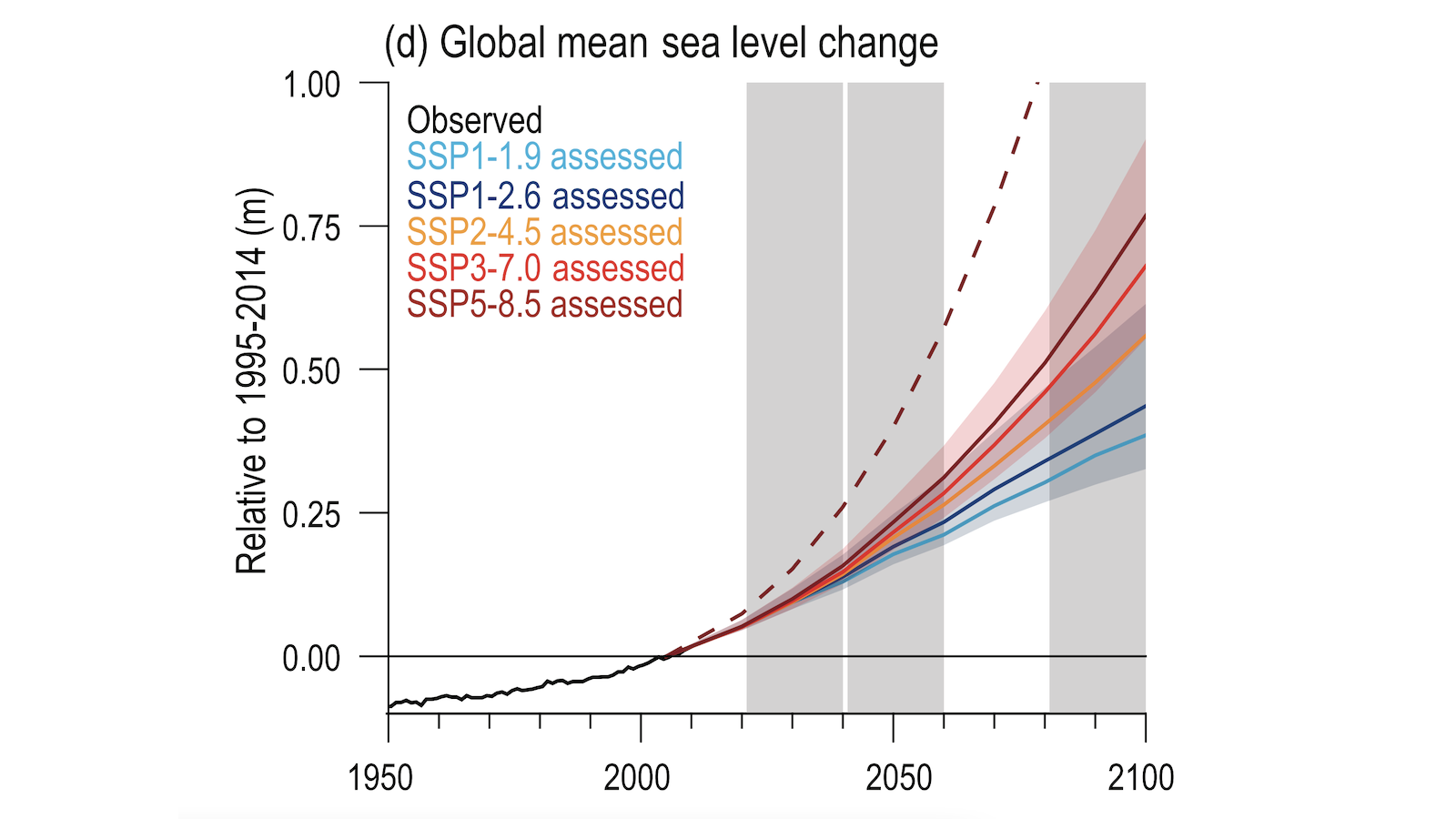
-
How does the IPCC “Synthesis” distort evidence about masterable climate changes, as part of overall improvements in human life, to be evidence of overwhelming, apocalyptic climate changes? Once again by exaggerating negative impacts and ignoring our climate mastery abilities.
-
An example of the Synthesis Report's ignoring of mastery is agriculture, a field of massive progress in recent decades as CO2 levels have risen. Humanity’s productivity has grown so fast that we can now produce more and more food while decreasing agriculture’s land footprint.12
-
The massive progress in agriculture was made possible by the improvement of crop species, increasing use of fossil-fueled farm equipment, fossil fuel-based fertilizers, and also increasing amounts of CO2 in the atmosphere (which increases photosynthesis productivity).13
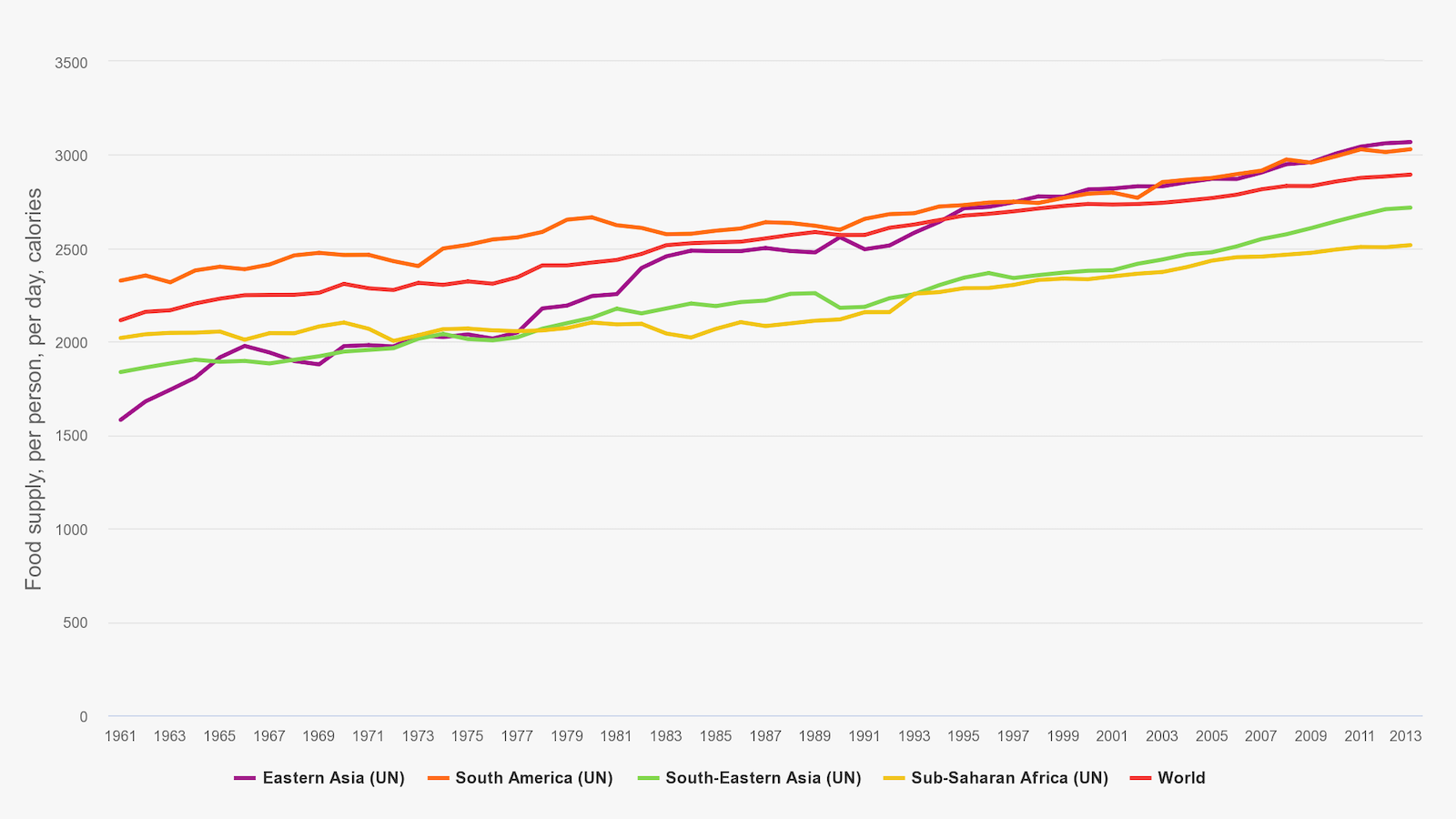
-
Given today's agricultural renaissance and the remaining potential for agricultural improvements in the developing world plus new technological advances, we should logically expect a bright, increasingly productive future for human agriculture—even with significant warming.
-
Instead of pointing out our unprecedented and increasing fossil-fueled ability to feed the world, the Synthesis Report ignores it and portrays fossil fuels as making things worse: “Increasing weather and climate extreme events have exposed millions of people to acute food insecurity”14
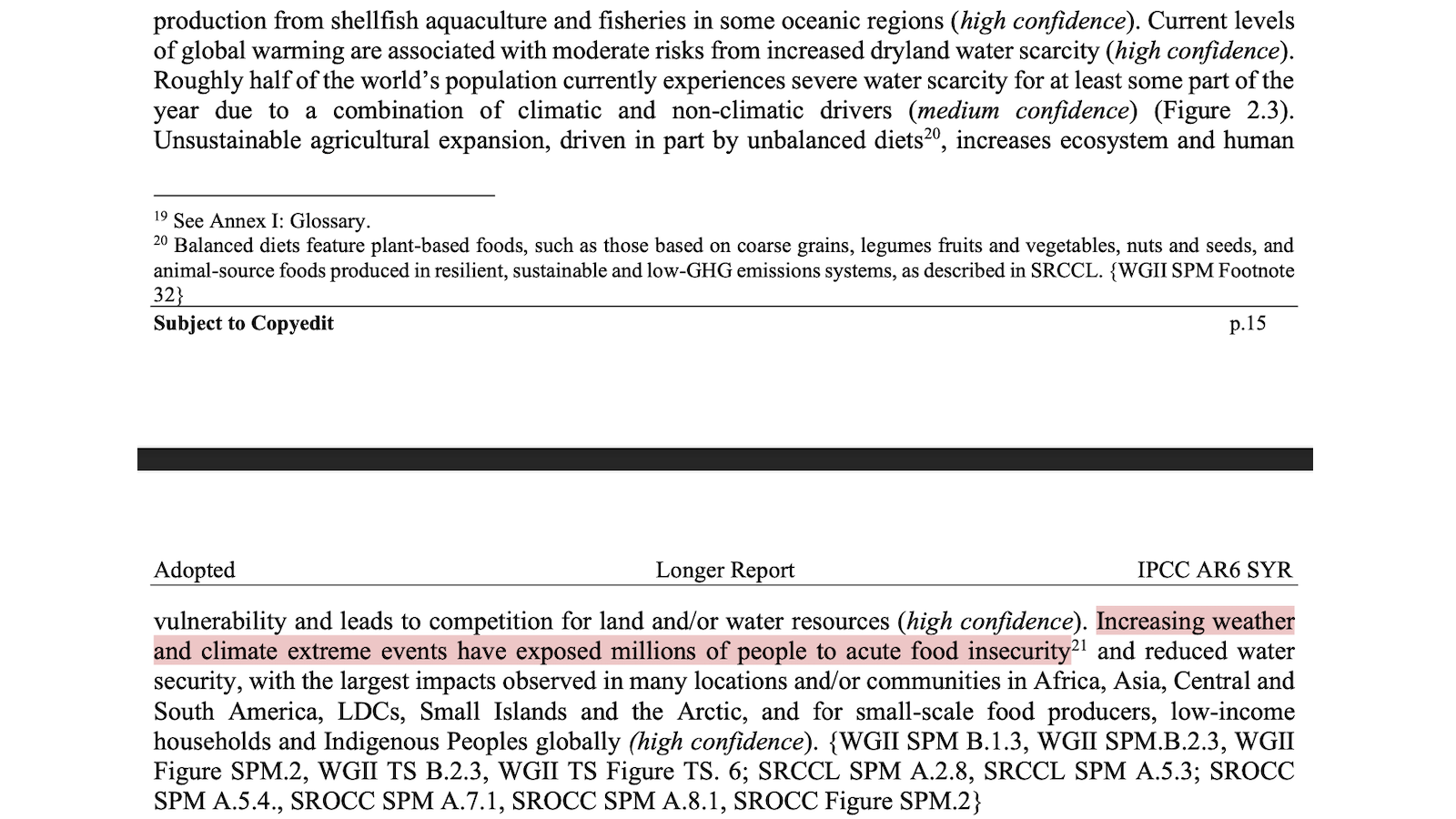
-
The IPCC implies that agriculture will take a serious hit from climate change, but it has to engage in massive ignoring of fossil fuel and CO2 benefits, as well as cherry-picking and distortion of the literature it cites to get there.
-
Example of IPCC bias: As Patrick Brown writes, when the IPCC “discusses weeds that might inhibit crop production, climate change, and enhanced CO2 are suddenly portrayed as being biologically beneficial rather than detrimental.” CO2 somehow makes weeds thrive and crops suffer!15
-
Any reasonable assessment of future agriculture would project continued growth in our ability to feed ourselves thanks to a combo of more CO2, better gene technology, mechanization in developing countries, etc. But the SR makes it sound like agriculture will decline in absolute terms.
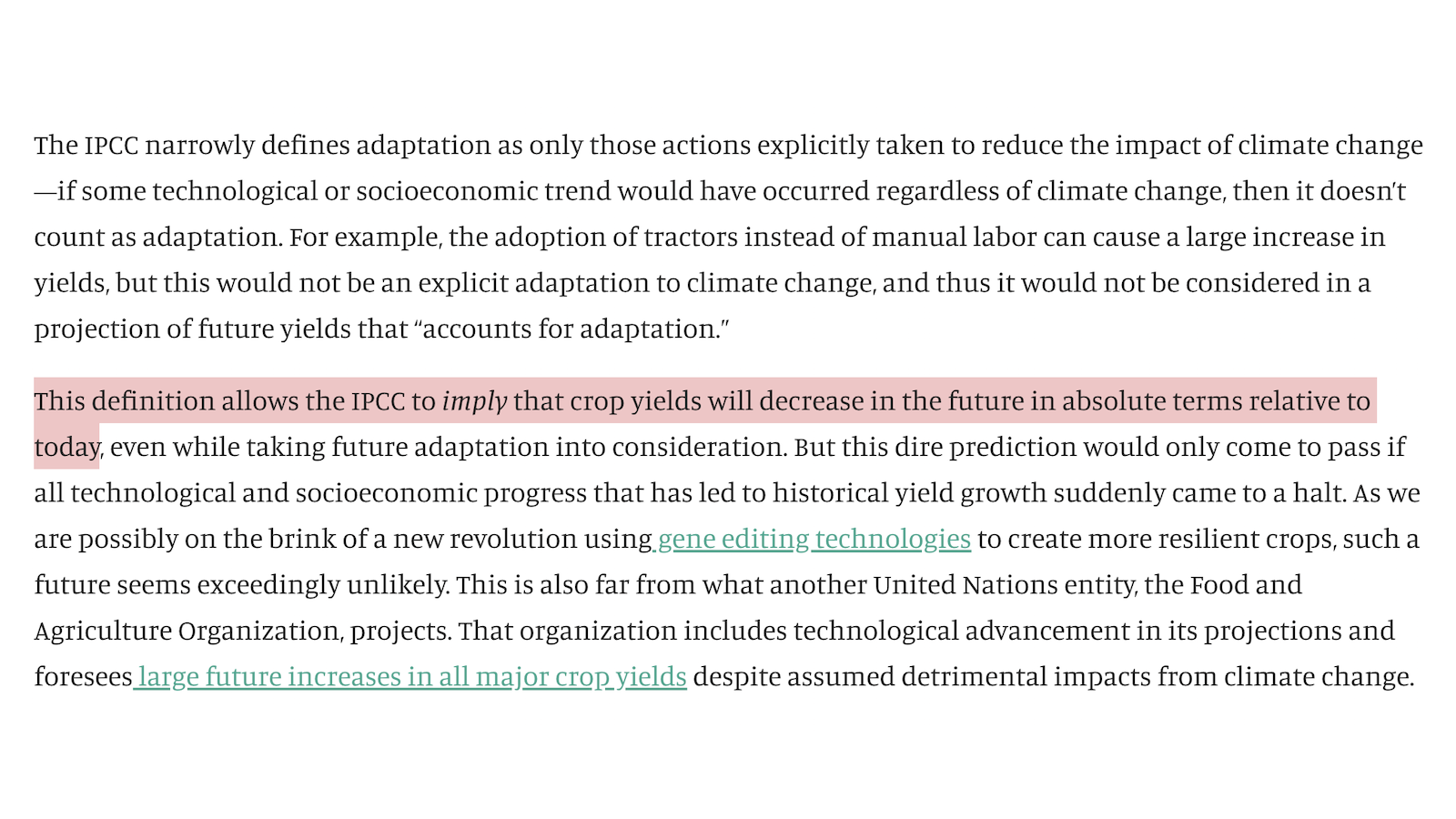
-
Another way the IPCC distorts reality is by abusing greenhouse gas emissions scenarios, called “Representative Concentration Pathways” (RCP), which reflect assumptions on future emissions that inform the climate model projections.
It deliberately uses unrealistic, extreme RCPs.
-
The dominant emissions scenario in the IPCC reports and much of the impact literature is the extreme scenario RCP8.5, which assumes our emissions continue to escalate into the 22nd century powered by an unrealistic growth in fossil fuel use, economic prosperity, and population.
-
RCP8.5 is already an implausible-to-impossible scenario. But it continues to be used, especially in the impact literature and the IPCC reports. It's often portrayed as a “business as usual” scenario to make projections of high negative impacts plausible.
-
As Roger Pielke and Justin Ritchie commented, “RCP8.5—the most commonly used RCP scenario… represents not just an implausible future in 2100, but a present that already deviates significantly from reality.”16
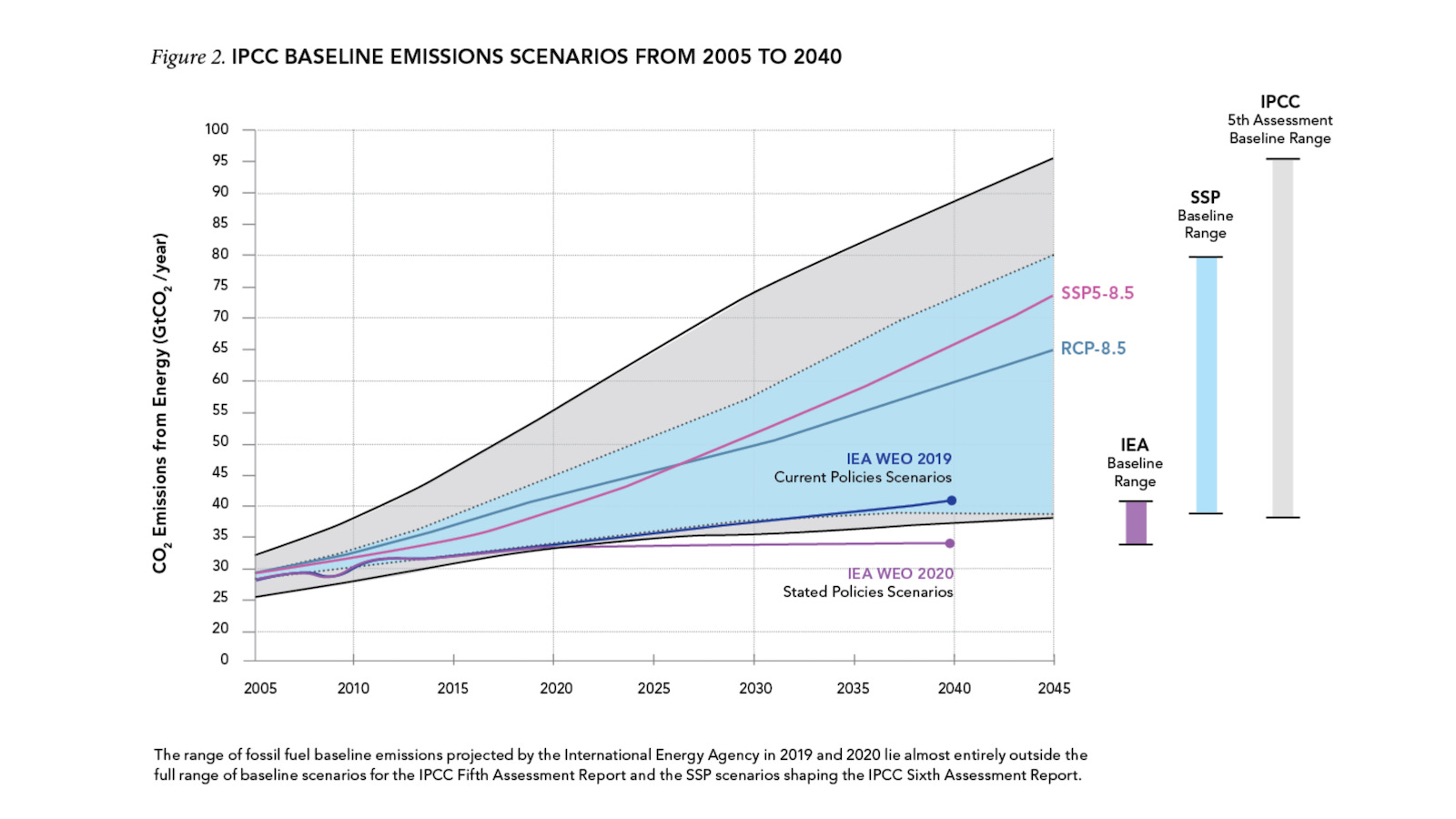
-
Even under a scenario of total “energy freedom,” which I advocate, we can expect global emissions to decline at some point later this century with the development of scalable, cost-effective alternatives—most likely nuclear. Thus RCP 8.5 doesn’t capture any plausible reality.
-
The reason the IPCC uses the unrealistic RCP8.5 scenario is to make its models produce the highest warming and negative impacts. That plus ignoring fossil fuels’ climate mastery and other benefits leads to more alarming (false) disaster projections.
-
To summarize: By exaggerating negative climate impacts and ignoring our ability to master them, IPCC's “Long-Term Climate and Development Futures” section scares us into thinking future generations will be worse off if we’re free to use fossil fuels, when the opposite is true.
-
How the IPCC's “Near-Term Responses in a Changing Climate” further perverts science to demand huge amounts of power and money
Not only does IPCC severely distort the science about our present and future climate impacts, it uses those distortions to advance a corrupt agenda.
-
Even if the IPCC was giving accurate information about our present and future climate impacts, as an entity with a climate focus it should not be making broader policy prescriptions—which involve expertise in many fields besides climate, and which also involve value choices.
-
Instead of restricting itself to a scientific advisor, the IPCC effectively advocates totalitarian, anti-fossil-fuel, anti-nuclear policies to reduce projected warming to 1.5°C above 1800s levels—just 0.5° above today’s.
And it totally violates cost-benefit analysis to do so.
-
The IPCC claims “Near-term actions that limit global warming to close to 1.5°C would substantially reduce projected losses and damages related to climate change in human systems and ecosystems” but fails to mention the enormous cost and human suffering such policies would create!
-
The IPCC falsely implies that limiting warming to 1.5°C (over 1800s levels) prevents harm by saying: “with every increment of warming, losses and damages will increase.” But this both ignores climate mastery and the catastrophic cost of rapidly restricting fossil fuel use.
-
Rapidly restricting fossil fuel use is catastrophic for 2 reasons:
1). Fossil fuels are a uniquely cost-effective form of energy—affordable, reliable, versatile, and scalable—which is why they’re 80% of energy use and still growing. 2) Billions of people need far more energy.17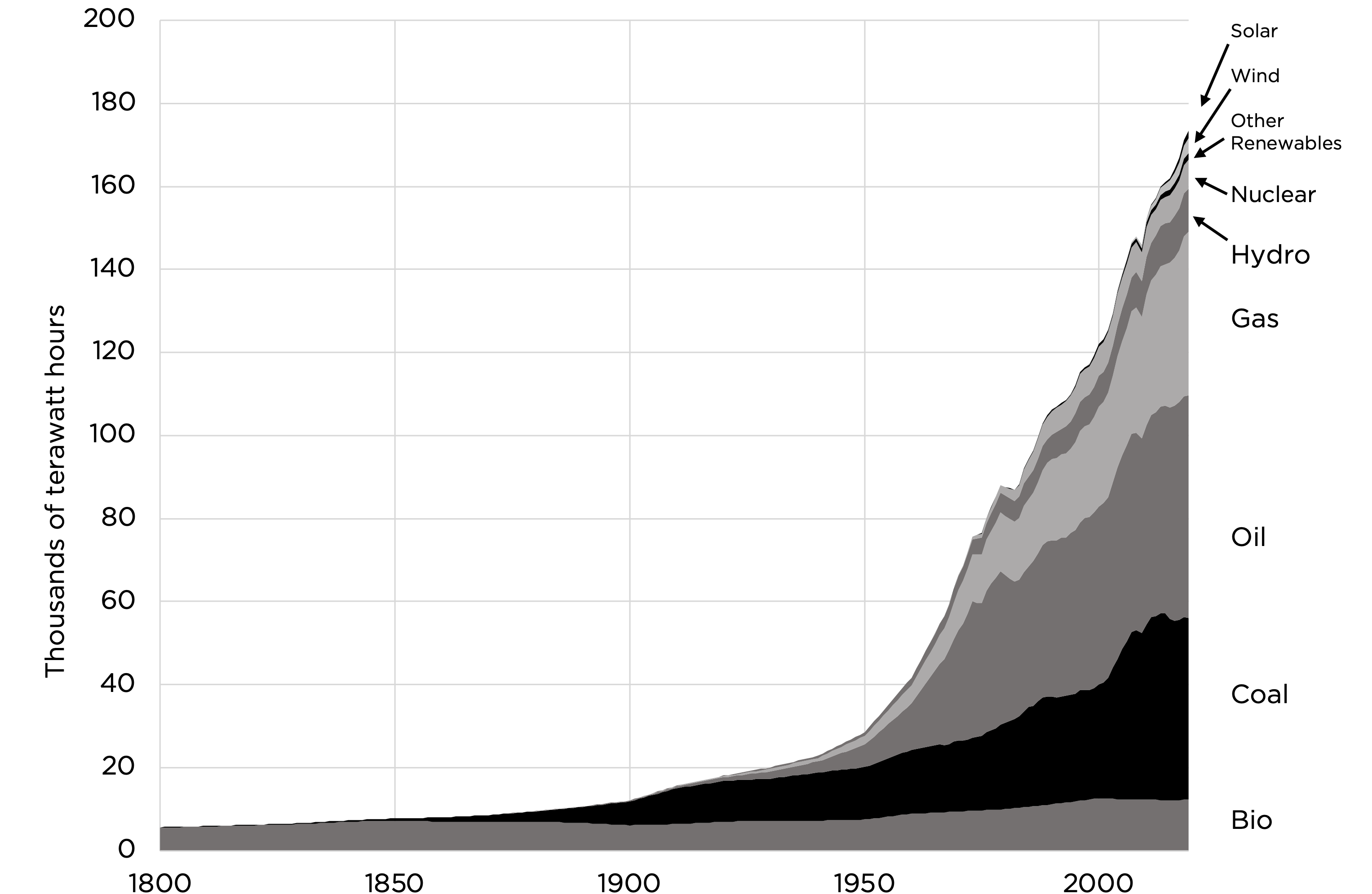
-
Instead of either staying out of energy economics or recognizing the reality that fossil fuels are uniquely cost-effective, the IPCC falsely portrays fossil fuels as easily replaceable by unreliable solar and wind, and notably refuses to endorse nuclear. This is solar and wind lobbying, not science.
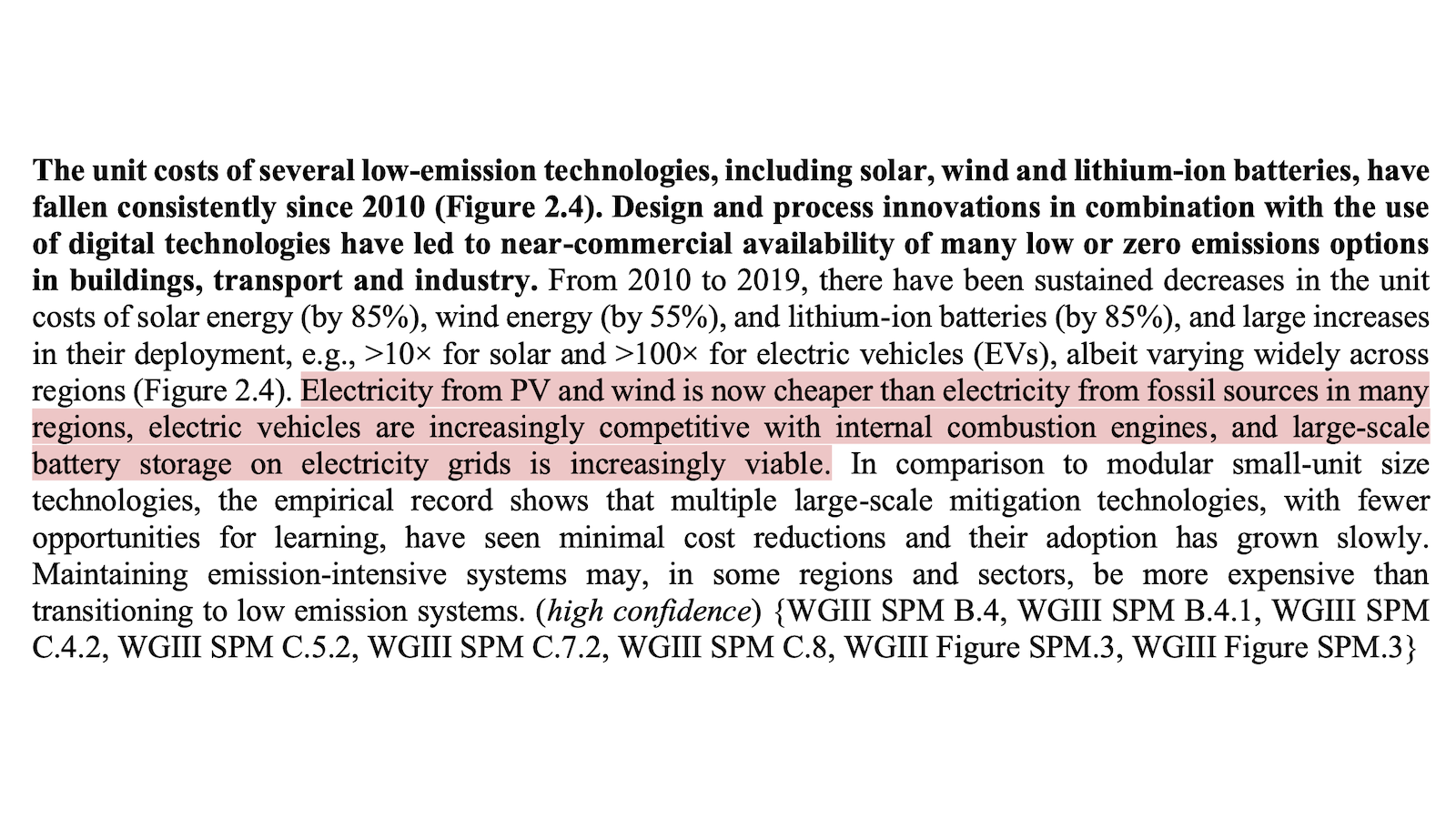
For more on the myth that solar/wind can rapidly replace fossil fuels, read this.
20 myths about fossil fuels, refuted
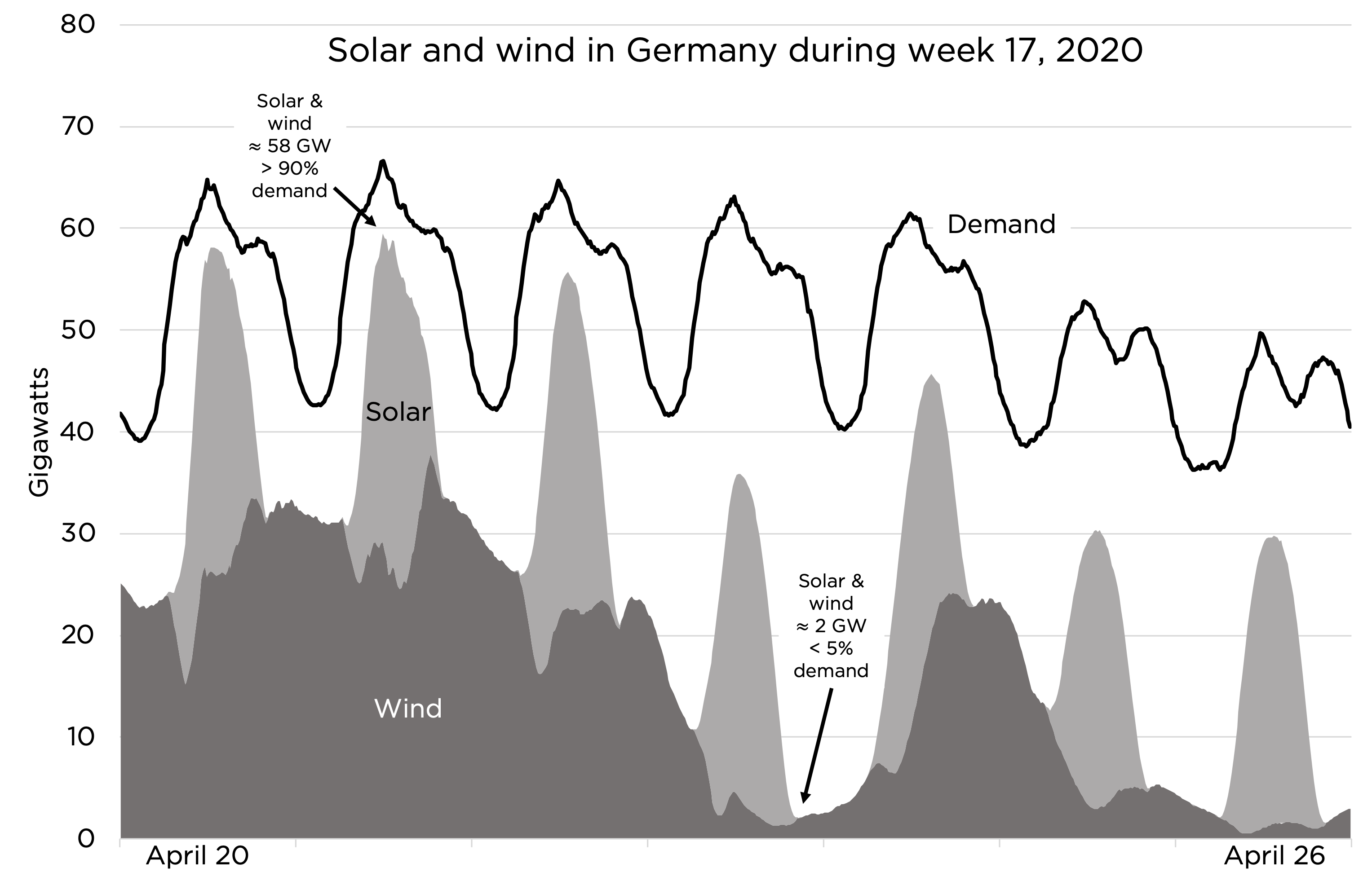
-
Reading the IPCC's policy recommendations makes it clear that many at the IPCC are just using the veneer of science to advocate all the standard far-left causes: “Actions that prioritise equity, climate justice, social justice and inclusion lead to more sustainable outcomes.”
-
Further illustrating that it’s a political activist, the IPCC also pushes for more money to go into the coffers of the professional curators of “climate action”: “If climate goals are to be achieved, both adaptation and mitigation financing would have to increase many-fold.”
-
Summary
The IPCC's “Synthesis Report” is a perversion of science that 1) exaggerates the negative climate impacts of fossil fuels and 2) denies the huge climate mastery benefits of fossil fuels, to 3) demands limitless power and money to implement catastrophic anti-fossil fuel goals.
-
The IPCC's “Synthesis” is so irrational and corrupt that all experts in climate and energy should unequivocally condemn this dangerous piece of garbage and the process that produced it.
The IPCC itself at minimum needs fundamental reform, and more likely needs to be abolished.
-
As I have long argued, and have now been fully vindicated about, the IPCC is a deeply corrupt organization that is animated by anti-human philosophical ideas, and run by power-lusters. https://twitter.com/AlexEpstein/status/1425155608005644290
-
We need more climate scientists to speak up, like Patrick Brown, who wrote that the report’s sections dealing with impacts and adaptation “read less like a serious scientific assessment and more like a flier for an activist meeting”. https://twitter.com/PatrickTBrown31/status/1641955423056961539
-
We need more experts to leave the IPCC, like hurricane expert Chris Landsea or economist Richard Tol, who left the IPCC in protest to how IPCC “summaries” distorted their work.18
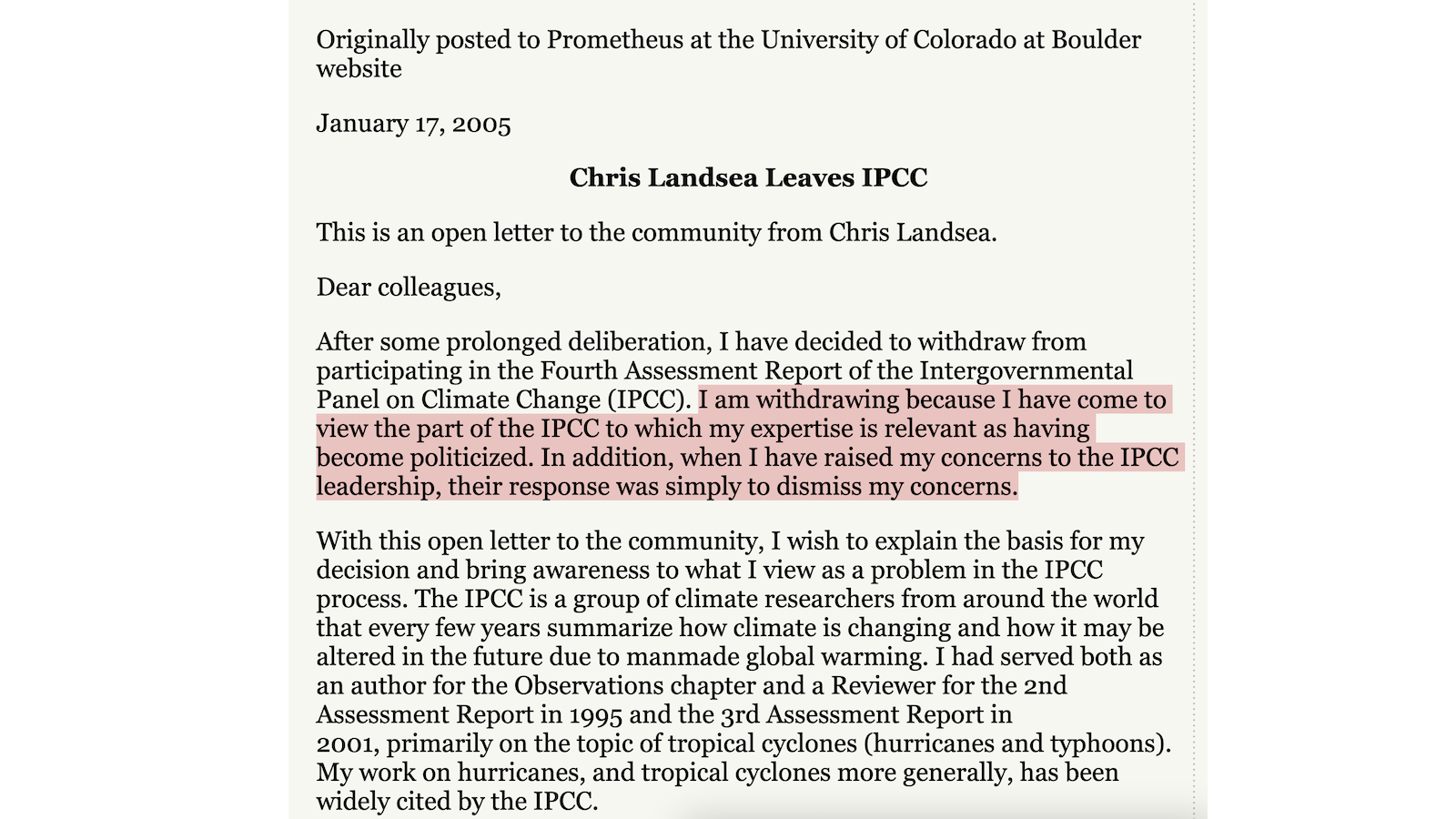
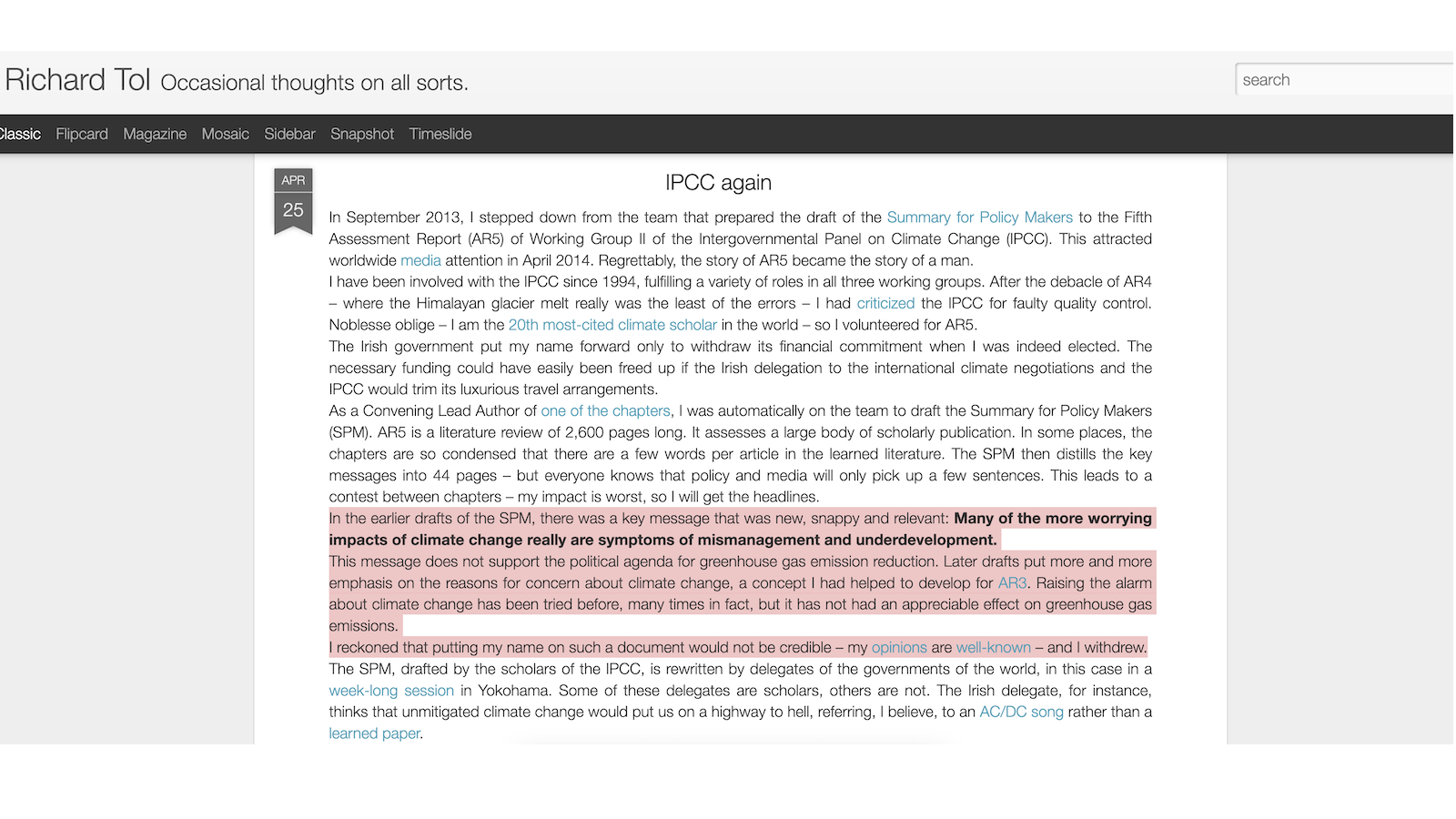
-
We need more experts to condemn the IPCC's Synthesis, given that it makes it possible for charlatans like UN Antonio Guterres to proclaim anti-scientific absurdities like “Humanity is on thin ice and that ice is melting fast… the climate time bomb is ticking.”
-
Unfortunately, only a small percentage of academic authors and contributors to the IPCC reports have spoken out about the perversion of science by the IPCC, above all its final “Synthesis.”
Please share this article with climate and energy experts and encourage them to speak up.
References
-
UN News - A liveable future for all is possible, if we take urgent climate action: flagship UN report↩
-
For every million people on earth, annual deaths from climate-related causes (extreme temperature, drought, flood, storms, wildfires) declined 98%--from an average of 247 per year during the 1920s to 2.5 in per year during the 2010s.
Data on disaster deaths come from EM-DAT, CRED / UCLouvain, Brussels, Belgium – www.emdat.be (D. Guha-Sapir).
Population estimates for the 1920s from the Maddison Database 2010 come from the Groningen Growth and Development Centre, Faculty of Economics and Business at University of Groningen. For years not shown, population is assumed to have grown at a steady rate.
Population estimates for the 2010s come from World Bank Data.↩
-
Roger Pielke - Has the IPCC Outlived its Usefulness?
Patrick Brown - The IPCC Report on the Impacts of Climate Change is Depressing↩
-
UC San Diego - The Keeling Curve
For every million people on earth, annual deaths from climate-related causes (extreme temperature, drought, flood, storms, wildfires) declined 98%--from an average of 247 per year during the 1920s to 2.5 in per year during the 2010s.
Data on disaster deaths come from EM-DAT, CRED / UCLouvain, Brussels, Belgium – www.emdat.be (D. Guha-Sapir).
Population estimates for the 1920s from the Maddison Database 2010 come from the Groningen Growth and Development Centre, Faculty of Economics and Business at University of Groningen. For years not shown, population is assumed to have grown at a steady rate.
Population estimates for the 2010s come from World Bank Data.↩
-
Roger Pielke - Weather and Climate Disaster Losses So Far in 2022, Still Not Getting Worse↩
-
Data on disaster deaths come from EM-DAT, CRED / UCLouvain, Brussels, Belgium – www.emdat.be (D. Guha-Sapir).
Population estimates for the 2010s come from World Bank Data.↩
-
CarbonBrief - Explainer: How ‘Shared Socioeconomic Pathways’ explore future climate change↩
-
Ronald Bailey - Humanity and Wild Nature Will Likely Both Be Flourishing in 2100
Our World in Data - Has the world passed peak agricultural land?↩
-
Patrick Brown - The IPCC Report on the Impacts of Climate Change is Depressing↩
-
Roger Pielke, Justin Ritchie - How Climate Scenarios Lost Touch With Reality↩